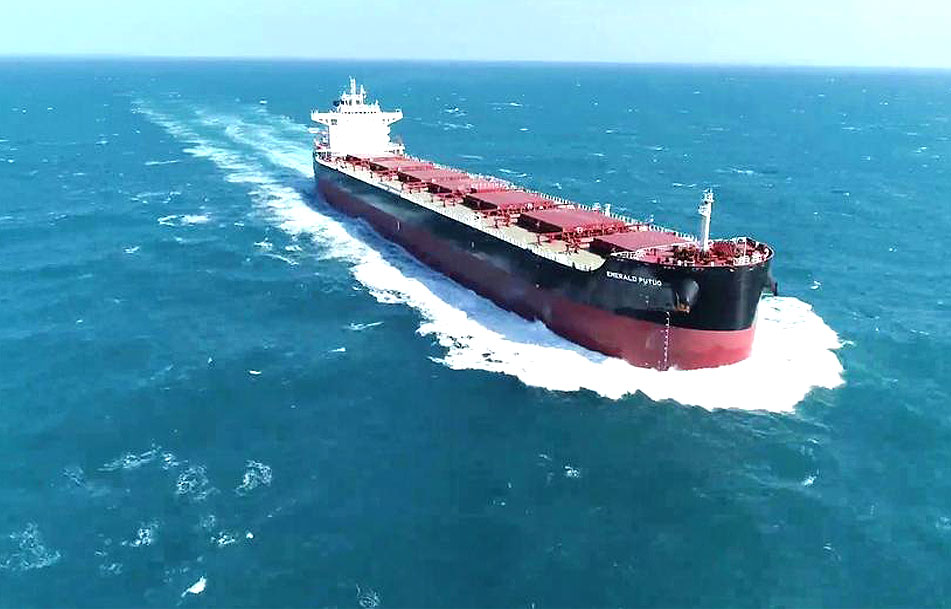bulk Commodity
The commodity trading industry is a crucial part of the global economy, covering a variety of different types of commodities, and its influence and status are self-evident. These commodities are usually defined as commodities with large quantities, frequent transactions, and significant price fluctuations, including energy products, metal products, agricultural products, etc.
The commodity trading industry is a pillar industry in many countries' economies. It not only directly affects a country's trade income and export business, but also indirectly affects the development and stability of the domestic economy. Therefore, the government and enterprises attach great importance to the development of the commodity trade industry and have taken a series of policy measures to support and promote its healthy development. Therefore, the commodity trading industry, with its unique position and role, is of great significance for the development and stability of the global economy. Their price fluctuations have a profound impact on the entire economic system. The price fluctuations of commodities are often regarded as one of the important macroeconomic indicators, which have a significant impact on inflation, economic growth, and financial market stability. In addition, commodity trade is also a major component of international trade, which is of great significance for the trade balance and international balance of payments between countries.

1. Industrial chain
Conduct market research on upstream links and bulk commodity trading companies. At this stage, the company needs to conduct in-depth research on the supply and demand situation, price trends, and competitor information in the commodity market. Subsequently, the company will engage in negotiations with commodity producers or suppliers, with a focus on ensuring the quality, price, and supply stability of the purchased goods.
Mid stream activities involving international trade and import and export. Commodity trading companies import and export commodities through cooperation with international suppliers, including international procurement, cross-border logistics, customs clearance, international payment settlement, and other links. The company needs to establish good cooperative relationships with overseas suppliers and effectively handle various procedures and issues related to overseas trade to ensure that goods can be safely and timely transported to their destination.
Downstream links, sales and marketing involving bulk commodities. Commodity trading companies sell purchased goods to end customers or other enterprises through wholesale and distribution channels, including cooperation with wholesalers and distributors, as well as management and expansion of sales channels. Similarly, the company also needs to carry out marketing and brand promotion activities to enhance the visibility and market share of bulk commodities. During the sales process, the company may also provide after-sales services, such as product quality assurance, customer complaint handling, etc., to ensure customer satisfaction and long-term cooperation.

2. Business model
When it comes to the business model of the commodity trading industry, it can be further subdivided and described in detail. The following are several common business models in the commodity trading industry, as well as their specific characteristics.
Trader/broker model: In this model, companies will make profits by purchasing bulk commodities and then exporting, importing, or selling in the local market. These companies typically act as intermediaries between buyers and sellers, responsible for transactions, logistics, payment and settlement of goods. They may focus on specific commodities such as energy, metals, agricultural products, etc., and may also be involved in a variety of commodities.
Warehouse and logistics model: In this model, companies generally have large warehouse facilities that provide warehousing, loading and unloading, sorting and other services. At the same time, they may also provide logistics transportation services, such as cargo transportation, cargo distribution, etc. This model of company plays an important role in commodity trade, ensuring the safe storage and timely delivery of goods.
Production and trade integration model: Some companies not only engage in the trade of commodities, but also directly participate in the production process of commodities. They have production bases domestically or overseas, engaged in the production and processing of raw materials, and trade and sell finished products. This model enables companies to better control product quality and supply chain, thereby enhancing competitiveness.
Vertical integration mode: In this mode, the company will integrate multiple links such as trade, production, logistics, etc. to achieve vertical integration and control the entire value chain. This model usually requires significant capital investment and resource integration, but it can also better grasp the market and reduce costs. Companies generally engage in multiple links such as production, processing, trade, and logistics of bulk commodities, forming a complete industrial chain.
Internet e-commerce model: With the development of the Internet, some bulk commodity trading companies have begun to use the Internet e-commerce model for trade activities. They trade, purchase and sell bulk commodities through online platforms, and use Internet technology to reduce transaction costs and improve transaction efficiency. This model makes transactions more convenient and transparent, while also expanding the company's market scope and customer base.

3. Technological development
The technological development of the commodity trade industry has undergone significant changes and progress in the past few decades. Among them, the application of information technology is a significant aspect. With the rise of the Internet and e-commerce platforms, the trading mode of bulk commodity trade has undergone fundamental changes. Traders and customers can use online platforms to conduct real-time transactions, obtain real-time market information, price changes, and supply and demand situations, greatly improving transaction efficiency and convenience. At the same time, information technology has also promoted the internationalization and globalization of commodity markets, making cross-border trade more convenient.
Another important technological development is the application of the Internet of Things and intelligent technology. The popularization of Internet of Things technology has made the logistics management of bulk commodities more intelligent and efficient. Through the Internet of Things technology, traders and logistics companies can monitor the transportation and storage of goods in real time, improving the safety and transportation efficiency of goods. In addition, the application of intelligent technology has also made production and processing processes more intelligent and automated, improving production efficiency and quality.
The development of big data and artificial intelligence technology has also brought tremendous changes to commodity trade. By analyzing massive market and transaction data, big data and artificial intelligence technology enable traders to more accurately predict market trends and price fluctuations, providing better decision support. At the same time, the application of artificial intelligence technology has also made the transaction process more intelligent and automated, improving transaction efficiency and accuracy.
Finally, the emergence of blockchain technology has brought higher transparency and security to commodity trade. Through blockchain technology, trade information will be immutable and traceable, effectively preventing information fraud and fraud, and improving the security and credibility of transactions. Meanwhile, blockchain technology can also simplify transaction processes, reduce transaction costs, and improve transaction efficiency.
4. Policy regulation
In China, the government has taken a series of measures to promote the healthy development of the commodity trade industry and maintain market order in terms of policy management. Firstly, in terms of international trade policy, the Chinese government actively promotes trade liberalization and economic globalization, providing a more convenient policy environment for the import and export of bulk commodities. In addition, the government has strengthened the management and supervision of the import and export process to ensure the legality and standardization of trade activities.
In terms of industry regulation, the Chinese government has established multiple departments responsible for regulating the bulk commodity trade industry. These departments have maintained market order and ensured the healthy development of the industry by strengthening market supervision and cracking down on illegal and irregular behaviors.
Agricultural Products.jpg
In terms of market regulation, the Chinese government has formulated a series of laws, regulations, and policy measures to regulate the operation of the commodity market, in order to maintain fair competition and consumer rights in the market.
In terms of information disclosure and supervision, the Chinese government requires commodity trading enterprises to disclose information and conduct regular supervision and inspection. This includes disclosure and supervision of financial information, product quality information, business behavior, and other aspects of the enterprise. Through information disclosure and supervision, the government has strengthened its supervision of the commodity trade market, improved market transparency, and prevented market manipulation and unfair competition.
